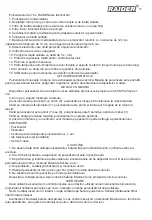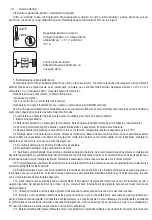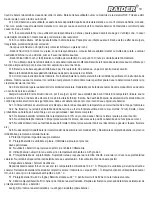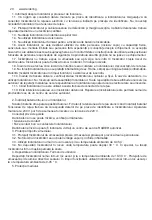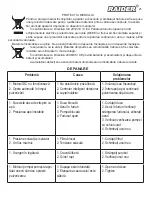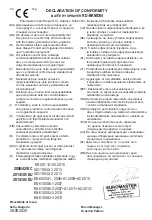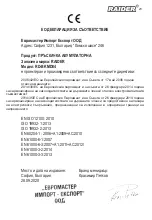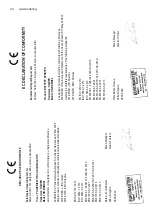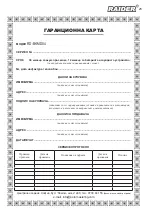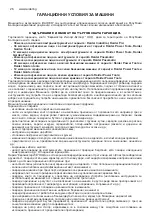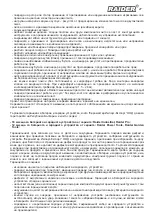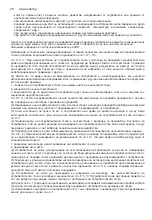
13
manual, responsible for safety. Care must be taken to ensure that children do not play with equipment. The charging process of the battery
should be under the control of the user.
3.13. The rechargeable battery should only be charged with the recommended charger. Using a charger designed to charge other
types of rechargeable batteries creates a risk of fire. The battery should only be used with machines from the R20 System. Using other
machines may cause injury or fire.
3.14. When the battery is not in use, it must be stored away from metal objects such as paper clips, coins, keys, nails, screws, or other
small metallic elements that may cause a short circuit in the battery contacts. Contact short circuit can cause injuries or fire.
3.15. In case of damage and / or improper use of the battery, gas discharge may occur. Ventilate the area, in the event of complaints
consult a doctor. Gases can damage the airways.
3.16. Under extreme conditions, liquid may run out of the battery. It can cause irritation or burns. If such a leakage is recorded,
proceed as follows:
- gently rub the liquid with a cloth. Avoid contact of the liquid with the skin and eyes;
- If the liquid comes into contact with the skin, the corresponding body area should be washed immediately with plenty of clean water,
possibly neutralizing the liquid with a weak acid such as lemon juice or vinegar;
- If the liquid gets into the eyes, rinse immediately with plenty of clean water for at least 10 minutes and seek medical attention.
3.17. Do not use a rechargeable battery that is damaged or modified. Damaged or modified rechargeable batteries can operate
unpredictably and cause fire, explosion, or risk of injury.
3.18. The battery should not be exposed to moisture or water. They also pose a danger to the aquatic environment.
The rechargeable battery should always be kept away from heat sources.
3.19. Follow all loading instructions. Do not charge the battery at a temperature outside the specified limits in the operating
instructions. Incorrect charging or charging at a temperature outside the specified range may damage the battery and increase the
risk of fire.
3.20. It is forbidden to repair damaged rechargeable batteries. Repairs may only be performed by the manufacturer or an authorized
service center.
Attention! Lithium-ion rechargeable batteries can leak, ignite or explode if they are heated to high temperatures or a short circuit.
They should not be stored in the car during hot and sunny days. Do not open the battery. Lithium-ion rechargeable batteries contain
electronic safety devices that, if damaged, can cause fire or explosion of the battery.
3.21. During use, the battery is warming up. Let it cool to room temperature before starting charging
3.22. Never use or recharge batteries if you suspect they have been recharged for the last time more than 12 months. There is a
high probability that the battery has already suffered a dangerous failure / complete discharge /
3.23. Charging rechargeable batteries at temperatures below 10 % will cause chemical damage to the cell and may cause a fire.
3.24. Do not use batteries that are heated during the charging process, as the battery cells may have malfunctioned.
3.25. Do not use batteries that have been bent or deformed during the gas charging / discharging process, cracking, whistling, etc.).
3.26. Never discharge the battery / recommended discharge level max. 40%). Full discharge of the battery will cause premature
aging of the battery cells.
4. Protection against environmental impact.
4.1. Protect the batteries from moisture and rain. Moisture and rain can cause
dangerous damage.
4.2. Do not use a battery near flammable vapors and liquids.
4.3. Use the battery only in dry places and at an ambient temperature of 0-45 C.
4.4. Protect the batteries from overheating. Overloading and exposure to direct sunlight will result in overheating of the cells. Never
do not recharge or recharge batteries that have overheated – immediately replace if possible.
5. Storage of the battery. Terms of use.
Store the battery only in a dry place and at an ambient temperature of 10-30 ° C. Protect them from moisture and direct sunlight.
Only recharge fully charged rechargeable batteries / charged at least 40% /. When operating, use the battery only in a dry place and at
an ambient temperature of 0-45 С ֯.
5.1. Protect the lithium-ion battery from frost. The batteries that are stored below 0 ° C for more than 60 minutes should be
discarded.
5.2. When handling batteries, be aware of the electrostatic charge. The electrostatic dilutions cause damage to the electronic
protection system and battery cells.
Beware of the electrostatic charge and never touch the battery poles.

















